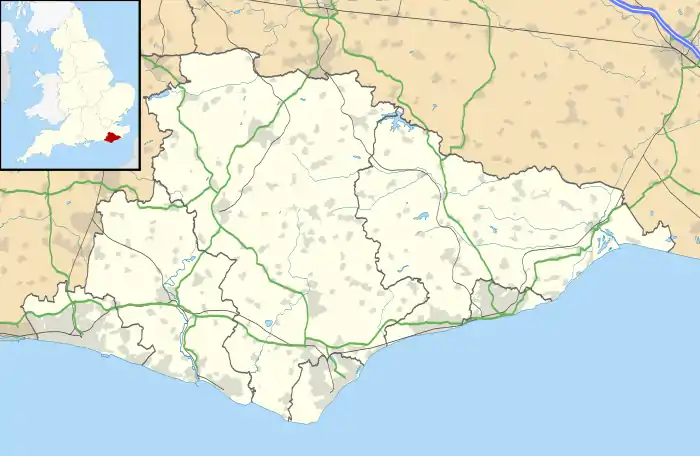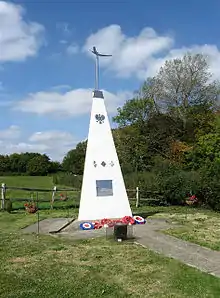RAF Chailey
RAF Chailey was a Royal Air Force station close to the village of Chailey near Burgess Hill in East Sussex during the Second World War. It was an example of an Advanced Landing Ground (ALG),[1][2] a type of simple, temporary airfield designed to support the invasion of continental Europe.
RAF Chailey | |||||||||||||||||||
|---|---|---|---|---|---|---|---|---|---|---|---|---|---|---|---|---|---|---|---|
| Summary | |||||||||||||||||||
| Airport type | Military | ||||||||||||||||||
| Operator | Royal Air Force | ||||||||||||||||||
| Location | Chailey | ||||||||||||||||||
| Built | 1942 | ||||||||||||||||||
| In use | 1942 - 1945 | ||||||||||||||||||
| Coordinates | 50°57′19″N 000°03′20″W | ||||||||||||||||||
| Map | |||||||||||||||||||
 RAF Chailey Location in East Sussex | |||||||||||||||||||
| Runways | |||||||||||||||||||
| |||||||||||||||||||

History
The airfield was on the site of Bower Farm, and was surveyed and commenced in 1942 by Fighter Command with the intention of creating a fighter station as part of the expansion following the Battle of Britain. It was not laid out until 1943, by which time the strategy was different and it was passed to the 2nd Tactical Air Force to become an operating station for the invasion of continental Europe, codenamed Operation Overlord.
In order to construct the airfield, the RAF demolished the local pub, 'The Plough', which was located at the end of the runway, and reconstructed it about half a mile away near Plumpton, and this is now the site of the RAF Chailey memorial.[3]
RAF Chailey hosted 131 Polish Wing, with three squadrons, as well as No 18 Fighter Section, controlling three wings of three squadrons, five of which were also Polish (302, 306, 308, 315 and 317) as well as squadrons from Mysore (129), Natal (222), Belgium (349) and New Zealand (485). The station's officer commanding was the highest ranking Pole in the RAF, Group Captain Aleksander Gabszewicz.
The airfield was de-requisitioned in 1945 and returned to farm use.
References
- Critchell, Andrew (October 2004). Airshow report - Flypast magazine October 2004.JPG "Chailey 60 years on" Check
|url=value (help). Flypast. - "Volume 8 - Heavy Conversion & Miscellaneous Units 1939-47 amendments and additions".
- "History of the Plough". The Plough at Plumpton.
